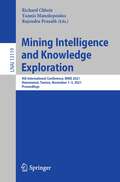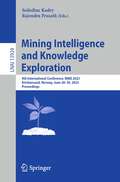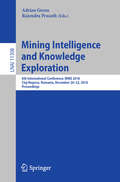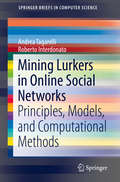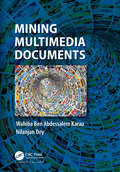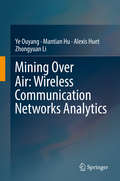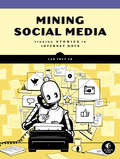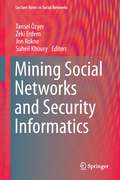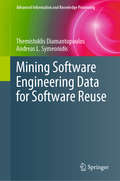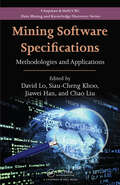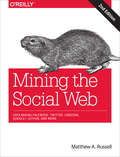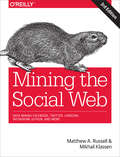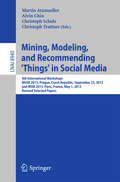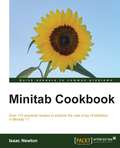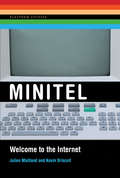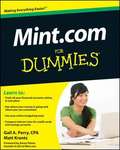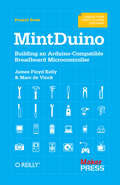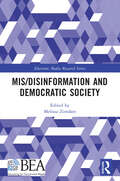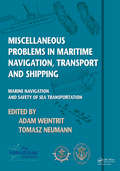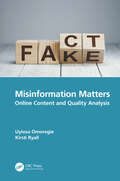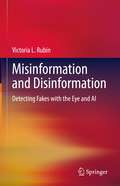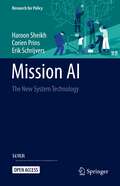- Table View
- List View
Mining Intelligence and Knowledge Exploration: 9th International Conference, MIKE 2021, Hammamet, Tunisia, November 1–3, 2021, Proceedings (Lecture Notes in Computer Science #13119)
by Richard Chbeir Yannis Manolopoulos Rajendra PrasathThis book constitutes revised selected papers from the refereed proceedings of the 9th International Conference on Mining Intelligence and Knowledge Exploration, MIKE 2021, which took place in Hammamet, Tunisia, in November 2021. The 22 full papers included in this book were carefully reviewed and selected from 61 submissions. They deal with topics such as evolutionary computation, knowledge exploration in IoT, artificial intelligence, machine learning, data mining and information retrieval, medical image analysis, pattern recognition and computer vision, speech / signal processing, text mining and natural language processing, intelligent security systems, Smart and Intelligent Systems, etc.
Mining Intelligence and Knowledge Exploration: 9th International Conference, MIKE 2023, Kristiansand, Norway, June 28–30, 2023, Proceedings (Lecture Notes in Computer Science #13924)
by Rajendra Prasath Seifedine KadryThis book constitutes the refereed post-conference proceedings of the 9th International Conference on Mining Intelligence and Knowledge Exploration, MIKE 2023, held in Kristiansand, Norway, during June 28–30, 2023. The 22 full papers and 16 short papers included in this book were carefully reviewed and selected from 87 submissions. They were grouped into various subtopics including Knowledge Exploration in IoT, Medical Informatics, Machine Learning, Text Mining, Natural Language Processing, Cryptocurrency and Blockchain, Application of Artificial Intelligence, and other areas.
Mining Intelligence and Knowledge Exploration: Third International Conference, Mike 2015, Hyderabad, India, December 9-11, 2015, Proceedings (Lecture Notes in Computer Science #9468)
by Rajendra Prasath Adrian GrozaThis book constitutes the refereed conference proceedings of the 6th International Conference on Mining Intelligence and Knowledge Exploration, MIKE 2018, held in Cluj-Napoca, Romania, in December 2018. The 33 full papers presented were carefully reviewed and selected from 93 submissions. The papers were grouped into various subtopics including evolutionary computation, knowledge exploration in IoT, artificial intelligence, machine learning, image processing, pattern recognition, speech processing, information retrieval, natural language processing, social network analysis, security, and fuzzy rough sets.
Mining Lurkers in Online Social Networks: Principles, Models, and Computational Methods (SpringerBriefs in Computer Science)
by Andrea Tagarelli Roberto InterdonatoThis SpringerBrief brings order to the wealth of research studies that contribute to shape our understanding of on-line social networks (OSNs) lurking phenomena. This brief also drives the development of computational approaches that can be effectively applied to answer questions related to lurking behaviors, as well as to the engagement of lurkers in OSNs. All large-scale online social networks (OSNs) are characterized by a participation inequality principle, i.e., the crowd of an OSN does not actively contribute, rather it takes on a silent role. Silent users are also referred to as lurkers, since they gain benefit from others' information without significantly giving back to the community. Nevertheless, lurkers acquire knowledge from the OSN, therefore a major goal is to encourage them to more actively participate. Lurking behavior analysis has been long studied in social science and human-computer interaction fields, but it has also matured over the last few years in social network analysis and mining. While the main target audience corresponds to computer, network, and web data scientists, this brief might also help increase the visibility of the topic by bridging different closely related research fields. Practitioners, researchers and students interested in social networks, web search, data mining, computational social science and human-computer interaction will also find this brief useful research material .
Mining Multimedia Documents
by Nilanjan Dey Wahiba Ben KaraaThe information age has led to an explosion in the amount of information available to the individual and the means by which it is accessed, stored, viewed, and transferred. In particular, the growth of the internet has led to the creation of huge repositories of multimedia documents in a diverse range of scientific and professional fields, as well as the tools to extract useful knowledge from them. <P><P>Mining Multimedia Documents is a must-read for researchers, practitioners, and students working at the intersection of data mining and multimedia applications. It investigates various techniques related to mining multimedia documents based on text, image, and video features. It provides an insight into the open research problems benefitting advanced undergraduates, graduate students, researchers, scientists and practitioners in the fields of medicine, biology, production, education, government, national security and economics.
Mining Over Air: Wireless Communication Networks Analytics
by Ye Ouyang Mantian Hu Alexis Huet Zhongyuan LiThis book introduces the concepts, applications and development of data science in the telecommunications industry by focusing on advanced machine learning and data mining methodologies in the wireless networks domain. Mining Over Air describes the problems and their solutions for wireless network performance and quality, device quality readiness and returns analytics, wireless resource usage profiling, network traffic anomaly detection, intelligence-based self-organizing networks, telecom marketing, social influence, and other important applications in the telecom industry. Written by authors who study big data analytics in wireless networks and telecommunication markets from both industrial and academic perspectives, the book targets the pain points in telecommunication networks and markets through big data. Designed for both practitioners and researchers, the book explores the intersection between the development of new engineering technology and uses data from the industry to understand consumer behavior. It combines engineering savvy with insights about human behavior. Engineers will understand how the data generated from the technology can be used to understand the consumer behavior and social scientists will get a better understanding of the data generation process.
Mining Social Media: Finding Stories in Internet Data
by Lam Thuy VoBuzzFeed News Senior Reporter Lam Thuy Vo explains how to mine, process, and analyze data from the social web in meaningful ways with the Python programming language.Did fake Twitter accounts help sway a presidential election? What can Facebook and Reddit archives tell us about human behavior? In Mining Social Media, senior BuzzFeed reporter Lam Thuy Vo shows you how to use Python and key data analysis tools to find the stories buried in social media.Whether you're a professional journalist, an academic researcher, or a citizen investigator, you'll learn how to use technical tools to collect and analyze data from social media sources to build compelling, data-driven stories.Learn how to: • Write Python scripts and use APIs to gather data from the social web • Download data archives and dig through them for insights • Inspect HTML downloaded from websites for useful content • Format, aggregate, sort, and filter your collected data using Google Sheets • Create data visualizations to illustrate your discoveries • Perform advanced data analysis using Python, Jupyter Notebooks, and the pandas library • Apply what you've learned to research topics on your ownSocial media is filled with thousands of hidden stories just waiting to be told. Learn to use the data-sleuthing tools that professionals use to write your own data-driven stories.
Mining Social Networks and Security Informatics
by Zeki Erdem Jon Rokne Suheil Khoury Tansel ÖzyerCrime, terrorism and security are in the forefront of current societal concerns. This edited volume presents research based on social network techniques showing how data from crime and terror networks can be analyzed and how information can be extracted. The topics covered include crime data mining and visualization; organized crime detection; crime network visualization; computational criminology; aspects of terror network analyses and threat prediction including cyberterrorism and the related area of dark web; privacy issues in social networks; security informatics; graph algorithms for social networks; general aspects of social networks such as pattern and anomaly detection; community discovery; link analysis and spatio-temporal network mining. These topics will be of interest to researchers and practitioners in the general area of security informatics. The volume will also serve as a general reference for readers that would want to become familiar with current research in the fast growing field of cybersecurity.
Mining Software Engineering Data for Software Reuse (Advanced Information and Knowledge Processing)
by Andreas L. Symeonidis Themistoklis DiamantopoulosThis monograph discusses software reuse and how it can be applied at different stages of the software development process, on different types of data and at different levels of granularity. Several challenging hypotheses are analyzed and confronted using novel data-driven methodologies, in order to solve problems in requirements elicitation and specification extraction, software design and implementation, as well as software quality assurance. The book is accompanied by a number of tools, libraries and working prototypes in order to practically illustrate how the phases of the software engineering life cycle can benefit from unlocking the potential of data. Software engineering researchers, experts, and practitioners can benefit from the various methodologies presented and can better understand how knowledge extracted from software data residing in various repositories can be combined and used to enable effective decision making and save considerable time and effort through software reuse. Mining Software Engineering Data for Software Reuse can also prove handy for graduate-level students in software engineering.
Mining Software Specifications: Methodologies and Applications (Chapman & Hall/CRC Data Mining and Knowledge Discovery Series)
by Jiawei Han Chao Liu David Lo Siau-Cheng KhooAn emerging topic in software engineering and data mining, specification mining tackles software maintenance and reliability issues that cost economies billions of dollars each year. The first unified reference on the subject, Mining Software Specifications: Methodologies and Applications describes recent approaches for mining specifications of sof
Mining of Massive Datasets
by Anand Rajaraman Jeffrey David UllmanThe popularity of the Web and Internet commerce provides many extremely large datasets from which information can be gleaned by data mining. This book focuses on practical algorithms that have been used to solve key problems in data mining and which can be used on even the largest datasets. It begins with a discussion of the map-reduce framework, an important tool for parallelizing algorithms automatically. The authors explain the tricks of locality-sensitive hashing and stream processing algorithms for mining data that arrives too fast for exhaustive processing. The PageRank idea and related tricks for organizing the Web are covered next. Other chapters cover the problems of finding frequent itemsets and clustering. The final chapters cover two applications: recommendation systems and Web advertising, each vital in e-commerce. Written by two authorities in database and Web technologies, this book is essential reading for students and practitioners alike.
Mining of Massive Datasets
by Anand Rajaraman Jeffrey David Ullman Jure LeskovecThe popularity of the Web and Internet commerce provides many extremely large datasets from which information can be gleaned by data mining. This book focuses on practical algorithms that have been used to solve key problems in data mining and which can be used on even the largest datasets. It begins with a discussion of the map-reduce framework, an important tool for parallelizing algorithms automatically. The authors explain the tricks of locality-sensitive hashing and stream processing algorithms for mining data that arrives too fast for exhaustive processing. The PageRank idea and related tricks for organizing the Web are covered next. Other chapters cover the problems of finding frequent itemsets and clustering. The final chapters cover two applications: recommendation systems and Web advertising, each vital in e-commerce. Written by two authorities in database and Web technologies, this book is essential reading for students and practitioners alike.
Mining the Social Web: Data Mining Facebook, Twitter, LinkedIn, Google+, GitHub, and More
by Matthew A. RussellWant to tap the tremendous amount of valuable social data in Facebook, Twitter, LinkedIn, and Google+? This refreshed edition helps you discover who's making connections with social media, what they're talking about, and where they're located. You'll learn how to combine social web data, analysis techniques, and visualization to find what you've been looking for in the social haystack--as well as useful information you didn't know existed. Each standalone chapter introduces techniques for mining data in different areas of the social Web, including blogs and email. All you need to get started is a programming background and a willingness to learn basic Python tools. Get a straightforward synopsis of the social web landscape Use adaptable scripts on GitHub to harvest data from social network APIs such as Twitter, Facebook, LinkedIn, and Google+ Learn how to employ easy-to-use Python tools to slice and dice the data you collect Explore social connections in microformats with the XHTML Friends Network Apply advanced mining techniques such as TF-IDF, cosine similarity, collocation analysis, document summarization, and clique detection Build interactive visualizations with web technologies based upon HTML5 and JavaScript toolkits "A rich, compact, useful, practical introduction to a galaxy of tools, techniques, and theories for exploring structured and unstructured data." --Alex Martelli, Senior Staff Engineer, Google
Mining the Social Web: Data Mining Facebook, Twitter, LinkedIn, Instagram, GitHub, and More
by Matthew A. Russell Mikhail KlassenMine the rich data tucked away in popular social websites such as Twitter, Facebook, LinkedIn, and Instagram. With the third edition of this popular guide, data scientists, analysts, and programmers will learn how to glean insights from social media—including who’s connecting with whom, what they’re talking about, and where they’re located—using Python code examples, Jupyter notebooks, or Docker containers.In part one, each standalone chapter focuses on one aspect of the social landscape, including each of the major social sites, as well as web pages, blogs and feeds, mailboxes, GitHub, and a newly added chapter covering Instagram. Part two provides a cookbook with two dozen bite-size recipes for solving particular issues with Twitter.Get a straightforward synopsis of the social web landscapeUse Docker to easily run each chapter’s example code, packaged as a Jupyter notebookAdapt and contribute to the code’s open source GitHub repositoryLearn how to employ best-in-class Python 3 tools to slice and dice the data you collectApply advanced mining techniques such as TFIDF, cosine similarity, collocation analysis, clique detection, and image recognitionBuild beautiful data visualizations with Python and JavaScript toolkits
Mining, Modeling, and Recommending 'Things' in Social Media
by Martin Atzmueller Alvin Chin Christoph Scholz Christoph TrattnerThis book constitutes the thoroughly refereed joint post-workshop proceedings of the 4th International Workshop on Mining Ubiquitous and Social Environments, MUSE 2013, held in Prague, Czech Republic, in September 2013, and the 4th International Workshop on Modeling Social Media, MSM 2013, held in Paris, France, in May 2013. The 8 full papers included in the book are revised and significantly extended versions of papers submitted to the workshops. The focus is on collective intelligence in ubiquitous and social environments. Issues tackled include personalization in social streams, recommendations exploiting social and ubiquitous data, and efficient information processing in social systems. Furthermore, this book presents work dealing with the problem of mining patterns from ubiquitous social data, including mobility mining and exploratory methods for ubiquitous data analysis.
Minitab Cookbook
by Isaac NewtonThis practical cookbook covers a broad range of topics in an easy-to-understand manner. Step-by-step instructions guide you through even the most complicated of tools in Minitab. This book is great for anyone who is familiar with statistics and who wants to learn how Minitab works. Whilst you do not need to be an expert in all areas of statistics, you should understand the basics of the chapters you are interested in.
Minitel: Welcome to the Internet (Platform Studies)
by Julien Mailland Kevin DriscollThe first scholarly book in English on Minitel, the pioneering French computer network, offers a history of a technical system and a cultural phenomenon.A decade before the Internet became a medium for the masses in the United States, tens of millions of users in France had access to a network for e-mail, e-commerce, chat, research, game playing, blogging, and even an early form of online porn. In 1983, the French government rolled out Minitel, a computer network that achieved widespread adoption in just a few years as the government distributed free terminals to every French telephone subscriber. With this volume, Julien Mailland and Kevin Driscoll offer the first scholarly book in English on Minitel, examining it as both a technical system and a cultural phenomenon. Mailland and Driscoll argue that Minitel was a technical marvel, a commercial success, and an ambitious social experiment. Other early networks may have introduced protocols and software standards that continue to be used today, but Minitel foretold the social effects of widespread telecomputing. They examine the unique balance of forces that enabled the growth of Minitel: public and private, open and closed, centralized and decentralized. Mailland and Driscoll describe Minitel's key technological components, novel online services, and thriving virtual communities. Despite the seemingly tight grip of the state, however, a lively Minitel culture emerged, characterized by spontaneity, imagination, and creativity. After three decades of continuous service, Minitel was shut down in 2012, but the history of Minitel should continue to inform our thinking about Internet policy, today and into the future.
Mint.com For Dummies
by Matt Krantz Gail A. Perry CPAGet empowered and take control of your personal finances with Mint.com!Mint.com is a free Web-based personal financial management service that helps you set up your day-to-day finances and track bank, credit card, investment, and loan transactions through a single Web site that is accessible anytime, anywhere in the world that you can access through the Internet. This fun and friendly guide arms you with expert advice for managing your bills, following where your money is going, developing a budget, paying off loans, saving for a house or car, maximizing investments, managing retirement savings, and more. The straightforward and easy-to-understand Dummies writing style shows you how to use Mint.com to get your finances organized--and keep them that way.Introduces you to Mint.com, the free personal online finance management service that helps you set up and track your day-to-day financesWalks you through the steps for creating a budget based on your current spending habits or creating a budget with goals in mind (saving for a new home or car, paying off college loans early, having a comfortable retirement, etc.)Tells you everything you need to do to track bank, credit card, investments, loan transactions and manage your billsShows you how to import and export tax information from Mint.com, including the tax software packages that make it the easiestIncludes handy checklists, expert tips, invaluable advice, and helpful warnings throughoutMint.com For Dummies helps you get your daily finances in mint condition!
MintDuino: Building an Arduino-Compatible Breadboard Microcontroller
by James Floyd Kelly Marc De VinckGet started with MintDuino, the Maker Shed kit that's perfect for learning or teaching the fundamentals of how microcontrollers work. This hands-on book shows you how to build a complete MintDuino project from start to finish. Learn how to assemble the microcontroller on a breadboard (no soldering required), and immediately begin programming it.You'll build the MintDuino Reflex Game in five separate stages or sub-tasks. Breaking down a large project into manageable tasks helps you track down errors quickly, and lets you see how each part of the circuit works. Once you complete the game, you'll have the resources and experience to tackle more MintDuino projects. If you’re interested in the fascinating world of microcontrollers, you'll enjoy this book.Wire up and program the MintDuino to light an LEDBuild a game that tests the reflexes of two playersLearn how to make your “game light” glow at random intervalsConstruct a pushbutton circuit to control individual players’ LEDsPut all of the components together, including simple code to control your game
Mis/Disinformation and Democratic Society (Electronic Media Research Series)
by Melissa ZimdarsDrawing on a variety of perspectives and methodologies, this collection explores the intricate relationship between mis- and disinformation and the functioning of democratic society.This book seeks to show how mis- and disinformation is destabilizing our collective confidence in institutions fundamental to the functioning of democratic society, including our electoral processes, our perceptions of trust in government officials and institutions, our healthcare, education, economic, and media systems; and even our communities and interpersonal relationships. Topics covered in this book include the role of Artificial Intelligence in automating deception; how financial crises and journalistic norms in the news industry create favorable conditions for the amplification and laundering of political disinformation; and how our emotional states impact our susceptibility to misinformation. Throughout, the authors provide nuanced definitions of key terms such as “conspiracy theory” and “digital democracy” which help level the field for future research.Mis/Disinformation and Democratic Society is recommended reading for researchers and advanced scholars in this dynamic area of study.
Miscellaneous Problems in Maritime Navigation, Transport and Shipping: Marine Navigation and Safety of Sea Transportation
by Adam Weintrit Tomasz NeumannThe TransNav 2011 Symposium held at the Gdynia Maritime University, Poland in June 2011 has brought together a wide range of participants from all over the world. The program has offered a variety of contributions, allowing to look at many aspects of the navigational safety from various different points of view. Topics presented and discussed at th
Misinformation Matters: Online Content and Quality Analysis
by Uyiosa Omoregie Kirsti RyallWhat is "misinformation"? Why does it matter? How does it spread on the internet, especially on social media platforms? What can we do to counteract the worst of its effects? Can we counteract its effects now that it is ubiquitous? These are the questions we answer in this book. We are living in an information age (specifically an "algorithmic age") which prioritizes information "quantity" over "quality". Social media has brought billions of people from across the world together online and the impact of diverse platforms, such as Facebook, WeChat, Reddit, LinkedIn, Signal, WhatsApp, Gab, Instagram, Telegraph, and Snapchat, has been transformational. The internet was created, with the best of intentions, as an online space where written content could be created, consumed and diffused without any real intermediary. This empowering aspect of the web is still, mostly, a force for good. People, on the whole, are better informed and online discussion is more inclusive because barriers to participation are reduced. As activity online has grown, however, an expanding catalogue of research reveals a darker side to social media, and the internet generally. Namely, misinformation’s ability to negatively influence our behaviour both online and offline. The solution we provide to this growing dilemma is informed by Ludwig Wittgenstein’s Tractatus Logico-Philosophicus, which examines the relationship between language and reality from a philosophical perspective, and complements Claude Shannon’s Information Quantity Theory, which addresses the quantification, storage and communication of digital information from a mathematical perspective. The book ends by setting out a model designed by us: a "Wittgensteinian" approach to information quality. It defines content published online by clarifying the propositions and claims made within it. Our model’s online information quality check allows users to effectively analyse the quality of trending online content. This approach to misinformation analysis and prevention has been designed to be both easy to use and pragmatic. It upholds freedom of speech online while using the "harm principle" to categorise problematic content.
Misinformation and Disinformation: Detecting Fakes with the Eye and AI
by Victoria L. RubinThis book, geared towards both students and professionals, examines the synthesis of artificial intelligence (AI) and psychology in detecting mis-/disinformation in digital media content, and suggests practical means to intervene and curtail this current global ‘infodemic’. This interdisciplinary book explores technological, psychological, philosophical, and linguistic insights into the nature of truth and deception, trust and credibility, cognitive biases and logical fallacies and how, through AI and human intervention, content users can be alerted to the presence of deception. The author investigates how AI can mimic the procedures and know-hows of humans, showing how AI can help spot fakes and how AI tools can work to debunk rumors and fact-check. The book describes how AI detection systems work and how they fit with broader societal and individual concerns. Each chapter focuses attention on key concepts and their inter-connection. The first part of the book seeks theoretical footing to understand our interactions with new information and reviews relevant empirical findings in behavioral sciences. The second part is about applied knowledge. The author looks at several known practices that guard us against deception, and provides several real-world examples of manipulative persuasive techniques in advertising, political propaganda, and public relations. She provides links to the downloadable executable files to three AI applications (clickbait, satire, and falsehood detectors) via LiT.RL GitHub, an open access repository. The book is useful to students and professionals studying AI and media studies as well as library and information professionals.Examines how artificial intelligence (AI) and psychology can aid in detecting mis-/disinformation and the language of deceit in digital media content;Suggests practical computational means to intervene and curtail the global ‘infodemic’ of fake news;Presents how AI can sift, sort, and shuffle digital content, to reduce the amount of content needed to be reviewed by humans.
Miss Switch Online
by Barbara Brooks WallaceFifth grade was a year full of flying brooms, spells-gone-wrong, and general craziness for Rupert P. Brown III. Sixth grade should be a little more normal, right? Wrong! Sixth grade brings a new teacher named Miss Blossom, a principal who is every girl's crush, a bird who's got a thing for math, and a whacked-out computer that leads Rupert to a Web site called computowitch.com -- with a password that's also the name of an evil witch from Rupert's past! As clever as he is, Rupert can probably use some help -- and who better to assist than his favorite bewitching teacher, Miss Switch?
Mission AI: The New System Technology (Research for Policy)
by Erik Schrijvers Corien Prins Haroon SheikhThis open access book offers a strategic perspective on AI and the process of embedding it in society. After decades of research, Artificial Intelligence (AI) is now entering society at large. Due to its general purpose character, AI will change society in multiple, fundamental and unpredictable ways. Therefore, the Netherlands Scientific Council for Government Policy (WRR) characterizes AI as a system technology: a rare type of technologies that have a systemic impact on society. Earlier system technologies include electricity, the combustion engine and the computer. The history of these technologies provides us with useful insights about what it takes to direct the introduction of AI in society. The WRR identifies five key tasks to structurally work on this process: demystification, contextualisation, engagement, regulation and positioning. By clarifying what AI is (demystification), creating a functional ecosystem (contextualisation), involving diverse stakeholders (engagement), developing directive frameworks (regulation) and engaging internationally (positioning), societies can meaningfully influence how AI settles. Collectively, these activities steer the process of co-development between technology and society, and each representing a different path to safeguard public values. Mission AI - The New System Technology was originally published as an advisory report for the government of the Netherlands. The strategic analysis and the outlined recommendations are, however, relevant to every government and organization that aims to take up 'misson AI' and embed this newest system technology in our world.
